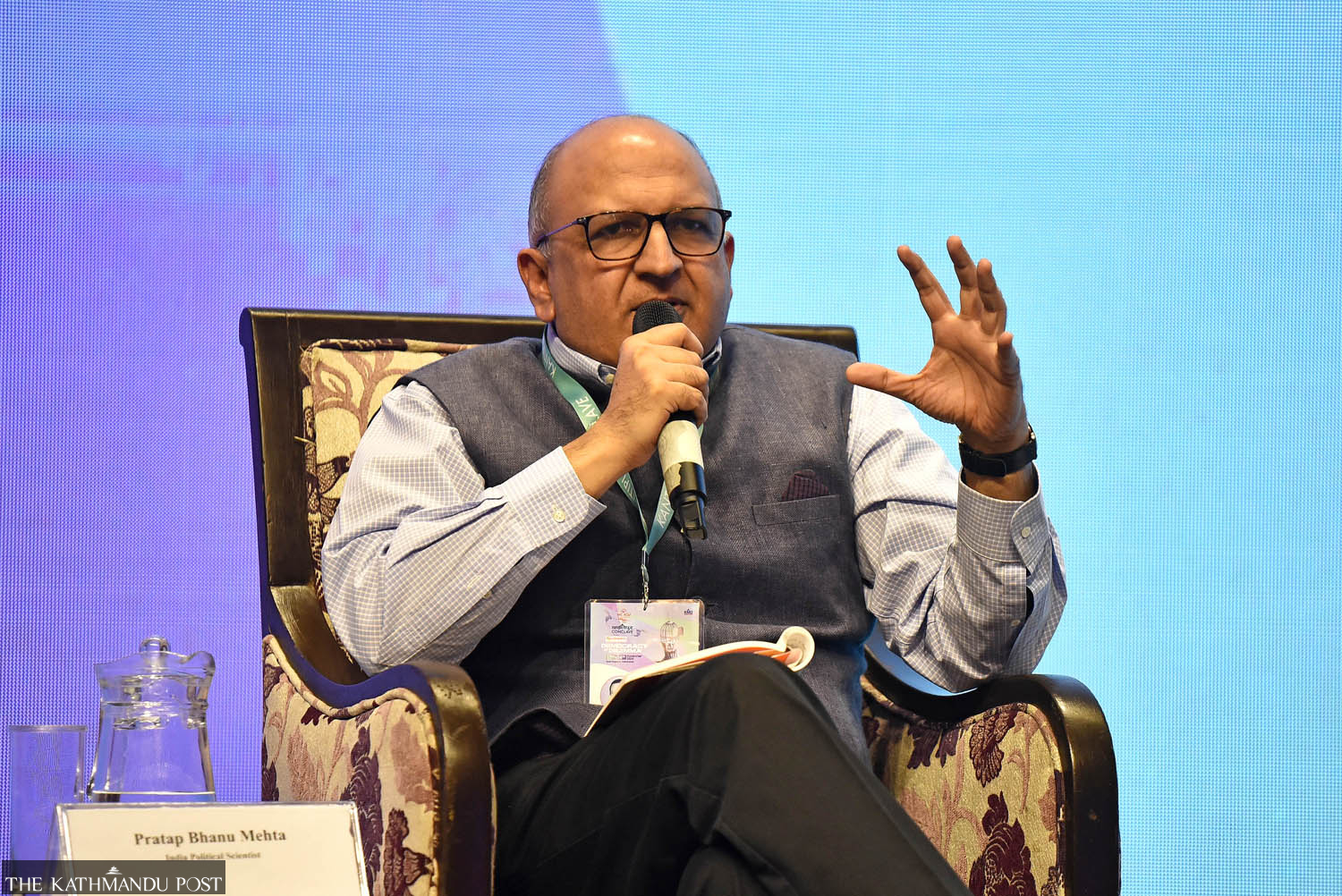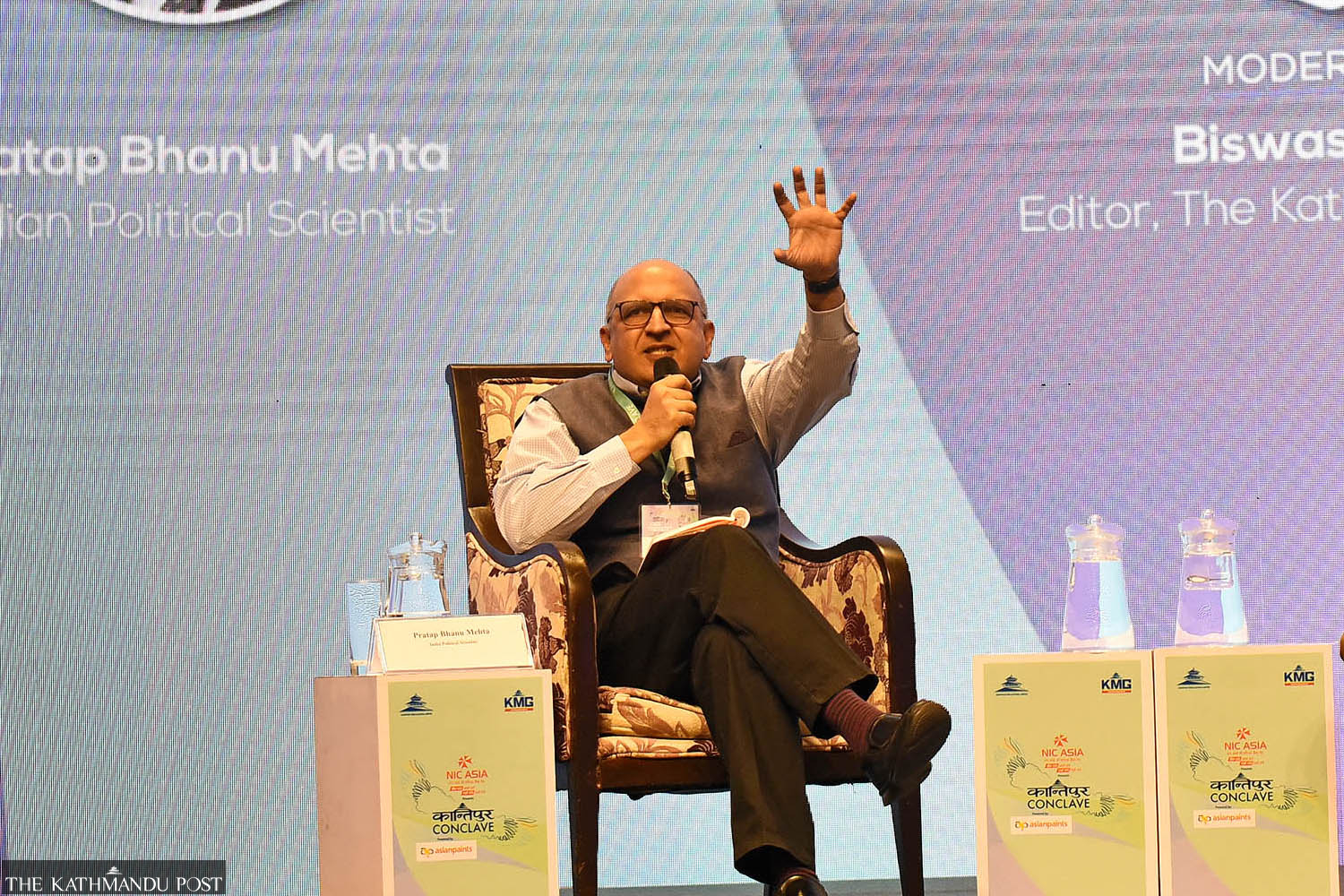Interviews
India should not have a veto on third-party investment in Nepal
We have absolutely no idea what the Chinese preferences are in the countries in the region.
Purushottam Poudel & Jagdishor Panday
Indian Political Scientist Pratap Bhanu Mehta has served on many central government committees, including India’s National Security Advisory Board and the Prime Minister of India’s National Knowledge Commission. A distinguished academician, Mehta has taught at Harvard, Princeton and JNU. Mehta, who was recently in Kathmandu for the fourth edition of Kantipur Conclave, talked to Purushottam Poudel and Jagdishor Panday on a range of issues. Excerpt:
How can we hold populist leaders accountable? Populist leaders who rise to power questioning traditional political parties and elites, seldom entertain the questions they themselves get.
Let alone be accountable, the populist leaders even disagree with how they are described. If we talk about Indian Prime Minister Narendra Modi, you see him most of the time at election rallies. There is a joke in India that it is always in election mode. Why should they be accountable to intermediate institutions when they are accountable to the people themselves? The essence of populism is to, in a sense, say that there is nothing between them and the people. And they feel like, who are the other people to ask them questions? When they get reelected with people’s mandate, what better accountability can there be?
In the age of information technology, populists speak directly to the people. Like Indian Prime Minister Modi, Donald Trump, the newly elected President of the US, had a similar approach during the US election. One short video can reach millions of people, and there are Elon Musk-like people who make sure that such a video reaches the masses.
When they are directly connected to the general public, they feel like they need not be accountable to a certain group of people in society, let’s say, elite professionals.
Populism is not a new phenomenon, but with the rise of social media, it seems to be gaining momentum. Can we differentiate between populism pre-social media and post-social media?
We should not exaggerate the importance of social media for the rise of populism. When we look at the Bharatiya Janata Party, the major ruling party of India, the remarkable thing is how hard they work in old-fashioned campaigns; they knock on people’s doors to reach out to them.
Trump did rallies after rallies before the US presidential election, so it is not necessary to buy the myth that it is the only social media that ignites populism. However, I do not want to discredit social media. The thing that is easy to do with social media is to destroy the credibility of old elites.
There is an asymmetry between truth and doubt. If I want to create doubt about you, it’s easy; I can cook up something stressing that what I claim is true. And we are in a moment where most authority structures are collapsing under the weight of that doubt. That is what all populist leaders thrive on. All they need to do is create doubt about the other side. They don’t have to test whether their claims are valid. Given the velocity at which social media works, fake information disseminates easily.
If someone makes a provocative clickbait tweet, by the time the other side collects accurate information for clarification, thousands of people would already have seen the tweet.
Soon after the printing press was invented in Europe in the 16th century, one consequence was a total collapse of the authority of the Catholic Church. After the press, people started to interpret things in their own way. The printing press coincided with two things: a great democratisation of knowledge and, on the other hand, a total collapse of authority. Populists like the collapse of authority because that creates space for them.
Therefore, I think we are in a period of trial and error. For example, there was great optimism that after the Arab Spring, social media would help democratisation. But we now realise that more than creating conditions for emancipation, it is mobilising hate in society. For me, the more critical question for democracy is the ownership of social media. Right now, social media is not only a medium. It is embedded in a structure of private ownership whose motive is profit. When your revenue depends on the number of likes you get, you will speak or write in a way that gathers you more likes. So it is a big elephant in the room of democracy, just like it was for the mainstream media many years ago.
During Modi’s first term, Sushma Swaraj led the foreign ministry. In his two latest terms, S Jaishankar has been doing so. Do you find any differences in their styles, or can we term Swaraj a liberalist and Jaishankar a realist?
In international relations, as a cardinal rule, you always watch what people do, not what they say. I mean, personality becomes their statement in most cases. Swaraj was a very adept and endearing politician. She knew how to talk like a politician. There was something charming about her. But I don’t think that is the key difference here. When it comes to decision-making, the Indian power structure is very centralised. Foreign policy perhaps more so.
Additionally, I do not think there has been a major shift in foreign policy in the three terms of Modi. The objective remains the same: to create maximum space for India’s development. India is always in an interesting position in the region, being friends with everybody and having better relations with everyone. It is the only power that can talk to Russia, America, Iran, and Israel; this is a remarkable achievement.
In the neighbourhood, I think it is a bit different. Manmohan Singh represented a generation that was convinced that the fate of the subcontinent was tied together. India is in the region; it cannot claim to be a global leader if it doesn’t do well in its own region.
I think the present regime in India thinks that India can transcend its region. They might think that they are the big power, and they deal with big powers. I see that the present government has invested less in the region compared to the previous government.
The second big change is cultural, which is also reflected in policy. I think 15-20 years ago, Indian politicians and civil society had more broad-spectrum relations with politicians and civil society in our neighbouring countries. When disputes arise in the region, social familiarity can help get over them. Familiar relations also allow you not to focus just on the near future and on tactical gains.
But due to the centralised policymaking in India, I see less public interest in India’s neighbourhood. I see much less intelligent discussion of our neighbourhood in India now than 10 years ago. Due to which we are constantly surprised by what’s happening in our neighbourhood. Which also shows that we have less social connection.
Are you suggesting Modi’s ‘neighbourhood first’ policy has been a failure?
To adjudicate on success or failure, you require prior account of your objective. At one level, you could say that. But, on the other hand, in Sri Lanka, India did well while addressing the debt crisis. There was also a period of blockade in Nepal years ago. India needs to reflect: Can we actually coerce our neighbours to do things we want? That’s not what we should do. Being of considerable power means we can care deeply about our neighbour’s well-being. The axiom should be that if Nepal and Bangladesh or any of the South Asian countries do well and grow, it’s to India’s benefit. Government comes and goes, but development remains. I don’t see that kind of commitment from India. Instead, I see it as being guided by geo-strategic considerations vis-à-vis China.
India should not have a veto on third-party investment in any of the neighbouring countries, including Nepal. Ultimately, if investment comes to Nepal, it will benefit India. Honestly, I feel that our neighbouring countries’ leadership doesn’t help; they often try to trade off their short-term benefit with the long-term benefits of the country; they are often found using one card against another neighbour.
Good relations between countries are often built on creative work of civil society, businessmen, and other sectors. Modi travels across the world to participate in different forums; plus he is an election man. How much time can he spare for neighbouring countries? Other sectors of India are investing less in the neighbours; if you think that’s a failure of India’s foreign policy, then yes, I also would say it is a failure.
When it comes to India’s relations with other South Asian countries, why is China such a big concern?
I will be very honest, there are many politicians who overplay China when it comes to relations with India, and vice-versa. Former president of Sri Lanka Mahinda Rajapaksa tried to do the same. The new government of the Maldives came in so hostile to India, expelled Indian troops soon after being elected as president. However, we have completely made up with them. The Maldives also realised that it struggles without Indian tourism.
The problem is that some people in our political class, intelligence services and bureaucracy try to be clever by half.
When it comes to China in South Asia, to be fair to the Indian establishment, they are actually quite sophisticated in their thinking about global chess moves. India is clear what its development interests are. And it is going to engage with whoever serves those interests. As I have already mentioned, India is the only power which is engaged with every great power.

I think it’s time to evolve to a detente with China after the Galwan clash. Relations are opening up again. When it comes to South Asia, it is not only about what India thinks but also what China does. When it comes to India, the biggest puzzle is that India could not fully understand China’s motives. And this is not only a problem of India but of most of the world. It is hard to read Chinese preferences.
The big tragedy and frustrating thing about foreign policy discussions in South Asia is that we know our stories, we talk, we write, but we have absolutely no idea what the Chinese preferences are in the countries in the region. So my own sense in the India-China relationship is going to be driven more by what China does. If China makes a conciliatory move, India is going to respond.
With Trump being re-elected the US President, how will the India-US relations fare during his second term?
It seems like the Trump administration will have a pro-India team. Trump has picked Mike Waltz as the National Security Advisor. Waltz used to be the head of the Indian caucus, and Marco Rubio is Secretary of State. Both are pro-India whereas they are bulwarks against China. So if you actually look at his team, India is happy.
On the other hand, he has contradictory interests. The Americans have an interest in promoting India in the global system, at least as a kind of balance against China. And I think one of the things the US has realised is that India is not going to be any ally but just a friend. There used to be a joke in the US that Pakistan is an ally, but not a friend. India is a friend, not an ally. So now they have learned to deal with India differently. Additionally, Indian Prime Minister Modi has good relations with Israeli Prime Minister Benjamin Netanyahu, which is very important to the US.
Despite all this, I think there is going to be friction or at least possibly friction in trade policy. For example, Elon Musk wants Starlink to come to South Asia, which is going to be tricky for India.
The other area that would create friction with Trump in the Oval Office is the issue of climate, which also matters to Nepal. With Trump, there could be severe consequences, and the worst of it will hit South Asia.
How do you think the twin developments of India-China rapprochement and Modi’s rapport with Trump will play out?
India was actually comfortable with administrations of both the Democrats and Republicans. The Democrats sometimes lecture India a bit more, but the truth is there is a bipartisan consensus on India in the US. Given that the US is paranoid with Russia and Iran, who would have thought that India will have close relations with both these countries? So there is a bipartisan consensus.
The Indian elite is now completely merged with the elites of the US. Every single ideological strand of US politics has a prominent Indian-American face. India-US relations are beyond geo-strategy. In my opinion, geo-strategy is the least interesting part. There are very few families in India’s elites who now don’t literally have family connections in the US.
The governments of two countries might quarrel, geo-strategy will take its place, but the social dynamics of the relationship are much more powerful in a way which India can never have with China or even with Europe excluding the UK.
However, India needs both the US and China. It needs the US for high-tech stuff. It needs China for lots of cheap intermediate imports to power its own industralisation.
On the rapprochement between India-China, China reached out considering the possible Trump tariffs. China too will need some export partners.
When India needs China for its industralisation why is Nepal’s economic ties with China a matter of concern for India?
In South Asia, China is all in. We’re all reliant on Chinese imports, not just consumer goods, but even to power whatever industries we have. China is increasingly becoming a technological powerhouse. Nepal can be like India, it doesn’t have to choose anyone. Either India should invest in the development of Nepal or let others do so.
It just has to reassure both partners that it’s not doing anything that’s going to be fundamentally detrimental to the relations with both the countries.
India-China rapprochement is the best thing that can happen for Nepal.
Though we feel that we know, we still fail to understand what China wants from the region. It might want assurance from Nepal that there is no anti-China activity. But, what beyond that? Honestly, no one knows.
Many of the Chinese projects in the region do not make any economic sense. It seems China is using its economy to actually please the leadership of those countries. China has distorted the political systems of these countries by using its economy. If not, why would someone invest in Hambantota port in Sri Lanka knowing it is not economically viable?

I think the interesting question is whether China will now take a more mature view in the relationship. It will be in South Asia’s interest if both India and China take a more mature view that clearly defines their core interests.
India and China are both accused of influencing Nepal’s internal affairs. But it’s also the fact that internally Nepali forces also invite that influence. They play their factional politics using India and China. So the Nepali establishment has to be clear not to play this game.
What in your opinion would most boost Nepal-India relations?
Good relationships of countries depend on lots of things, along with people-to-people relations. When it comes to Nepal-India relations, there is an open border which takes our relationship to a different level and we take it for granted. Besides, business interests in both countries are something that promotes the relationship to different levels. Despite the Sino-US relations worsening, the creators of American capital urged the need of China for their economy. Same with Sino-India relations.
Are you suggesting all political differences be kept at bay and Nepal-India focus on economic relationship?
Nepal has to think about what is in its interest, but it has to take some intelligent strategic calls. Can Nepal get Tata, Adani and Ambani groups to invest in Nepal? I doubt it. But, if that happens, other trade stuff will automatically follow.
To be honest, the political dispute between Nepal and India won’t be solved anytime soon. How can the government of both sides convince the people on the map and border issues even if they want to resolve it?
The problem is that politicians of both our countries use those political disputes for domestic mobilisation. There have been politicians in Nepal who are tempted to use the anti-India card in popular politics. And there are politicians in India, a civil society structure that is very tempted to use Nepal in domestic politics. One should remember that using a foreign policy issue for domestic consumption is not something fruitful.
There are media reports creating a narrative that India is unhappy with KP Sharma Oli and especially his impending China visit. Should the China visit by Nepali prime minister be a matter of concern for India?
I fail to understand why India gets worried about this kind of thing. The nature of Nepal-India relations should be like they can walk in and out anytime. But it is not obvious that India is signalling that they are not happy with Nepali prime minister’s China visit.




 18.12°C Kathmandu
18.12°C Kathmandu





.jpg&w=200&height=120)







